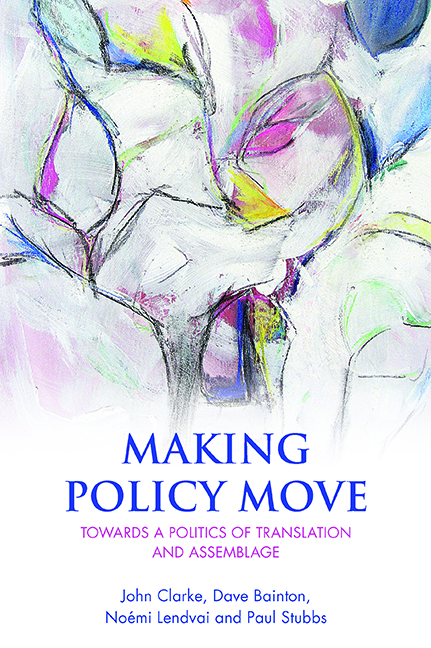Book contents
- Frontmatter
- Contents
- Introduction
- One Moving policy studies
- Two Translation, assemblage and beyond: towards a conceptual repertoire
- Three Performing reform in South East Europe: consultancy, translation and flexible agency
- Four The managerialised university: translating and assembling the right to manage
- Five Soft governance, policy fictions and translation zones: European policy spaces and their making
- Six Translating education: assembling ways of knowing otherwise
- Seven ‘Policy otherwise’: towards an ethics and politics of policy translation
- References
- Index
Five - Soft governance, policy fictions and translation zones: European policy spaces and their making
Published online by Cambridge University Press: 07 March 2022
- Frontmatter
- Contents
- Introduction
- One Moving policy studies
- Two Translation, assemblage and beyond: towards a conceptual repertoire
- Three Performing reform in South East Europe: consultancy, translation and flexible agency
- Four The managerialised university: translating and assembling the right to manage
- Five Soft governance, policy fictions and translation zones: European policy spaces and their making
- Six Translating education: assembling ways of knowing otherwise
- Seven ‘Policy otherwise’: towards an ethics and politics of policy translation
- References
- Index
Summary
Introduction
Translation offers immensely rich repertoires for tracing policies as they move, travel and morph. However, while many different things move (ideas, templates, policy toolkits, actors, actants, artefacts, lessons, best practices), we know remarkably little about how policies travel across languages, or how policies are produced through translation practices. This chapter aims to interrogate the European Union's (EU’s) Open Method of Coordination (OMC) for social inclusion and its complex and unexpected translations into Hungarian. For this chapter, translation offers an alternative to the ‘epistemic modernism’ that dominates mainstream policy studies and its understanding of policy transfer, policy diffusion and policy learning. Despite the insistence of both policy and academic discourses, this chapter will not look for evidence of policy ‘learning’, ‘lesson-drawing’ or ‘convergence’; quite the opposite, it questions rationalistic assumptions of policy transfers, it argues for unlearning rather than learning, it brings into sharper focus traces of fictions rather than traces of evidence, and it argues for understanding the OMC not as a techno-zone, but rather as a translation zone. These are, of course, not binary oppositions: fiction is not the opposite of reality, fiction makes reality; unlearning is a particular form of learning; and the techno-zone as a representation is crucial in the making of the translation zone. What a translation perspective does in this chapter is to make an alternative academic inquiry possible: an inquiry that asks new questions and allows for radically different representations of policy, as well academic discourses on ‘Europeanisation’. This chapter cannot, on its own, answer to this call, but what it aims to achieve is to offer some initial, provisional and tentative steps towards that agenda.
Policy in translation: four shreds
In order to explore a translation perspective, this chapter builds on four shreds of translation: the performative, the relational, the multiple and the political. Each of the shreds plays an important role in trying to capture the complex ‘translations’ of social inclusion through the EU's OMC.
The performative, which has long been neglected by mainstream policy studies (Gottweis, 2007), works with a notion of a ‘lived and embodied conception of “doing” rather than interpreting or implementing policy’ (Newman, 2013b: 526).
- Type
- Chapter
- Information
- Making Policy MoveTowards a Politics of Translation and Assemblage, pp. 131 - 156Publisher: Bristol University PressPrint publication year: 2015



